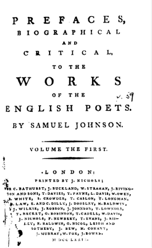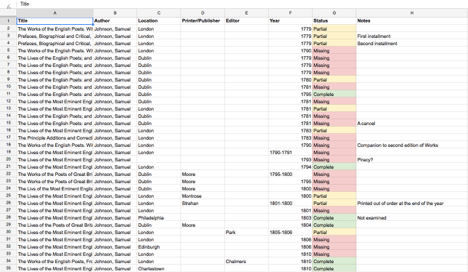After lives; or, the true history of Samuel Johnson in a digital archive
1 May 2016
When the Princeton Prosody Archive received its original data from the HathiTrust Digital Library, this data included over three hundred entries attributed to Samuel Johnson. Such a high volume of entries (not to mention the peculiar breadth and range of topics covered in Johnson’s writing), posed a peculiar problem: How to organize these texts in a manner that acknowledges Johnson’s contribution to prosody, but which is also navigable, representative, and curated?

Though aspirations to become a playwright had brought Johnson to London, his play Irene never garnered him popular attention. Rather he supported himself by producing reports on Parliament, political commentaries, and periodical essays. The Dictionary marked a turning point in Johnson’s career. It took him nine years to complete, during which time he suffered numerous trials including the death of his beloved wife, economic hardship, and bouts of depression. Yet upon its publication, the Dictionary was saluted as a great national accomplishment and Johnson was hailed as a great national hero [1].
Lives represents the opposite pole of Johnson’s career. The text that we known familiarly today as Lives of the Poets began as Prefaces, Biographical and Critical, to the Works of the English Poets. Developed in part as a palliative measure to buttress the London book trade from northern competition, the specific impetus motivating the publication of Works was another anthology, John Bell’s The Poets of Great Britain [2]. In stark contrast to the unknown scholar who had humbly accepted the commission for the Dictionary just over three decades earlier, Johnson was sought out to write prefaces for the new anthology as the most respected literary critic of his era [3]. At first Prefaces were sold only with Works. Market pressures soon forced London booksellers to collect and publish them independently under the title The Lives of the Most Eminent English Poets [4]. The Lives are of interest to the Prosody Archive for their original prefatory function as well as for their critical content.
The Johnson materials included incomplete, duplicate, abridged, and mislabeled files. My task was to impose order on this mélange. I began by transcribing J. D. Fleeman’s bibliography into a spreadsheet to use as a map against which to compare the assortment of texts in the Archive. Fleeman’s bibliography was important to this project because it provided a sense of scope. Next, I examined each of the texts that we had received from the HathiTrust to verify the metadata and determine if prosodic materials were present. Finally, I spent time exploring inside of the texts to determine what kind of selection the Archive represents.

Abundant scholarship has been produced on the composition, publication, and post-publication history of the Dictionary. Little has been produced on the Lives. So this is where I focused my attention. Why is this text anatomized, anthologized, reprinted, and repackaged so many times? What might constitute a representative selection to be included in the Archive? What changes does this collection of editions represent?
While Johnson’s Lives retains a remarkable consistency of form and content throughout two centuries of being continuously in print, it would be reductive, I argue, to isolate a “core” text that is the Lives. Rather, the history of this text reveals many different roles it has played, lives it has lived. From its original conception as a series of brief prefaces to its birth as a robust collection of literary biographies, to its growth apart from Works and the development its own historical identity, Lives is a text that defies facile classification. Comparing the maturation of the Lives across multiple centuries offers a fertile ground for further scholarship.
[1] Allen Reddick, The Making of Johnson’s Dictionary, 1746-1773. (New York: Cambridge University Press, 1996), 1-2.
[2] J. D. Fleeman, A Bibliography of the Works of Samuel Johnson: Treating His Published Works From the Beginnings to 1984. (New York: Oxford University Press, 1999-2000). 1352.
[3] Kevin Hart, Samuel Johnson and the Culture of Property. (New York: Cambridge University Press, 1999). 76.
[4] Fleeman, A Bibliography. 1370.